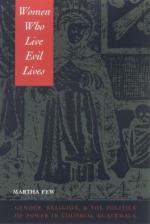|
This section contains 6,120 words (approx. 21 pages at 300 words per page) |

|
Scholars reading ancient texts from a feminist stance have long identified the problematic of studying women's experience through men's records of history and male accounts of religious beliefs and practices. In naming the problem, or deconstructing how history has been presented, the way is made open to allow for reconstructions that are not necessarily inscribed with the "male gaze." Knowledge of the ancient world is fragmentary not only because it lacks a credible picture of women's lives but also because there is a void when it comes to those who belonged to anything other than an elite class or to specific geographical areas. In attempting to overcome these restraints, a variety of methodologies need to be employed to read the variety of ancient ethnographic evidence available to reconstruct women's experiences. The method of "reading against the grain," for example, can...
|
This section contains 6,120 words (approx. 21 pages at 300 words per page) |

|




